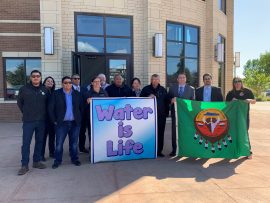
![]()
On the same day the Trump Administration announced that up to 240,000 people may succumb to the COVID-19 virus, TransCanada announced it is proceeding with KXL pipeline construction. In fact, TransCanada outlined several activities scheduled for April all along the route of the pipeline, not just at the border. With this construction, workers will descend on the communities along the pipeline’s proposed path. TransCanada ignores the threat that this influx of people creates during the COVID-19 pandemic.
In the face of the rapidly evolving COVID-19 pandemic, the Fort Belknap Indian Community and Rosebud Sioux Tribe asked the court to grant a temporary restraining order on pipeline construction. The Tribes are asking the court to put a short hold on construction until a hearing scheduled later this month.
“Fort Belknap has declared a state of emergency on the reservation because of the extremely dangerous COVID-19 pandemic and its threat to the health and well-being of the Gros Ventre and Assiniboine tribal members,” said President Werk of the Fort Belknap Indian Community. “We are very concerned about TransCanada bringing in outside construction workers from all over to build this pipeline within an hour from our reservation.”
A two-week delay in the face of a pandemic would seem like the obvious course of action. Instead, despite the danger to tribal citizens and all of the people living in the area, TransCanada is pushing to quickly build as much of the pipeline as possible. Of course, they can then use this ongoing construction as justification for allowing the project to proceed whether or not the project is legal.
“We are in unprecedented times, and to continue in the face of this pandemic and place our communities at greater risk is irresponsible,” said NARF Staff Attorney Matthew Campbell. “The KXL pipeline as currently routed violates the treaties, federal law, and tribal law. We’re asking that the United States honor its treaty obligation to protect Rosebud and Fort Belknap.”
During this time of uncertainty and crisis, NARF is committed to protecting the health, safety, and rights of Native Americans.
#HonorTheTreaties
Learn more about Rosebud Sioux Tribe v. Trump.
The post TransCanada Pushes KXL Construction Despite COVID-19 Threats appeared first on Native American Rights Fund.
![]()
On the same day the Trump Administration announced that up to 240,000 people may succumb to the COVID-19 virus, TransCanada announced it is proceeding with KXL pipeline construction. In fact, TransCanada outlined several activities scheduled for April all along the route of the pipeline, not just at the border. With this construction, workers will descend on the communities along the pipeline’s proposed path. TransCanada ignores the threat that this influx of people creates during the COVID-19 pandemic.
In the face of the rapidly evolving COVID-19 pandemic, the Fort Belknap Indian Community and Rosebud Sioux Tribe asked the court to grant a temporary restraining order on pipeline construction. The Tribes are asking the court to put a short hold on construction until a hearing scheduled later this month.
“Fort Belknap has declared a state of emergency on the reservation because of the extremely dangerous COVID-19 pandemic and its threat to the health and well-being of the Gros Ventre and Assiniboine tribal members,” said President Werk of the Fort Belknap Indian Community. “We are very concerned about TransCanada bringing in outside construction workers from all over to build this pipeline within an hour from our reservation.”
A two-week delay in the face of a pandemic would seem like the obvious course of action. Instead, despite the danger to tribal citizens and all of the people living in the area, TransCanada is pushing to quickly build as much of the pipeline as possible. Of course, they can then use this ongoing construction as justification for allowing the project to proceed whether or not the project is legal.
“We are in unprecedented times, and to continue in the face of this pandemic and place our communities at greater risk is irresponsible,” said NARF Staff Attorney Matthew Campbell. “The KXL pipeline as currently routed violates the treaties, federal law, and tribal law. We’re asking that the United States honor its treaty obligation to protect Rosebud and Fort Belknap.”
During this time of uncertainty and crisis, NARF is committed to protecting the health, safety, and rights of Native Americans.
#HonorTheTreaties
Learn more about Rosebud Sioux Tribe v. Trump.
The post TransCanada Pushes KXL Construction Despite COVID-19 Threats appeared first on Native American Rights Fund.
